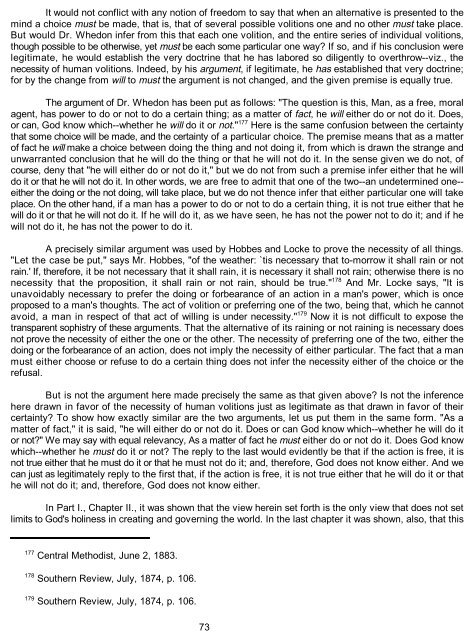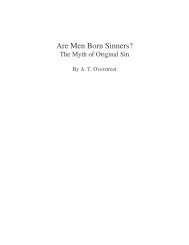Foreknowledge by Joel Hayes - Library of Theology
Foreknowledge by Joel Hayes - Library of Theology
Foreknowledge by Joel Hayes - Library of Theology
You also want an ePaper? Increase the reach of your titles
YUMPU automatically turns print PDFs into web optimized ePapers that Google loves.
It would not conflict with any notion <strong>of</strong> freedom to say that when an alternative is presented to the<br />
mind a choice must be made, that is, that <strong>of</strong> several possible volitions one and no other must take place.<br />
But would Dr. Whedon infer from this that each one volition, and the entire series <strong>of</strong> individual volitions,<br />
though possible to be otherwise, yet must be each some particular one way? If so, and if his conclusion were<br />
legitimate, he would establish the very doctrine that he has labored so diligently to overthrow--viz., the<br />
necessity <strong>of</strong> human volitions. Indeed, <strong>by</strong> his argument, if legitimate, he has established that very doctrine;<br />
for <strong>by</strong> the change from will to must the argument is not changed, and the given premise is equally true.<br />
The argument <strong>of</strong> Dr. Whedon has been put as follows: "The question is this, Man, as a free, moral<br />
agent, has power to do or not to do a certain thing; as a matter <strong>of</strong> fact, he will either do or not do it. Does,<br />
177<br />
or can, God know which--whether he will do it or not." Here is the same confusion between the certainty<br />
that some choice will be made, and the certainty <strong>of</strong> a particular choice. The premise means that as a matter<br />
<strong>of</strong> fact he will make a choice between doing the thing and not doing it, from which is drawn the strange and<br />
unwarranted conclusion that he will do the thing or that he will not do it. In the sense given we do not, <strong>of</strong><br />
course, deny that "he will either do or not do it," but we do not from such a premise infer either that he will<br />
do it or that he will not do it. In other words, we are free to admit that one <strong>of</strong> the two--an undetermined oneeither<br />
the doing or the not doing, will take place, but we do not thence infer that either particular one will take<br />
place. On the other hand, if a man has a power to do or not to do a certain thing, it is not true either that he<br />
will do it or that he will not do it. If he will do it, as we have seen, he has not the power not to do it; and if he<br />
will not do it, he has not the power to do it.<br />
A precisely similar argument was used <strong>by</strong> Hobbes and Locke to prove the necessity <strong>of</strong> all things.<br />
"Let the case be put," says Mr. Hobbes, "<strong>of</strong> the weather: `tis necessary that to-morrow it shall rain or not<br />
rain.' If, therefore, it be not necessary that it shall rain, it is necessary it shall not rain; otherwise there is no<br />
178<br />
necessity that the proposition, it shall rain or not rain, should be true." And Mr. Locke says, "It is<br />
unavoidably necessary to prefer the doing or forbearance <strong>of</strong> an action in a man's power, which is once<br />
proposed to a man's thoughts. The act <strong>of</strong> volition or preferring one <strong>of</strong> the two, being that, which he cannot<br />
179<br />
avoid, a man in respect <strong>of</strong> that act <strong>of</strong> willing is under necessity." Now it is not difficult to expose the<br />
transparent sophistry <strong>of</strong> these arguments. That the alternative <strong>of</strong> its raining or not raining is necessary does<br />
not prove the necessity <strong>of</strong> either the one or the other. The necessity <strong>of</strong> preferring one <strong>of</strong> the two, either the<br />
doing or the forbearance <strong>of</strong> an action, does not imply the necessity <strong>of</strong> either particular. The fact that a man<br />
must either choose or refuse to do a certain thing does not infer the necessity either <strong>of</strong> the choice or the<br />
refusal.<br />
But is not the argument here made precisely the same as that given above? Is not the inference<br />
here drawn in favor <strong>of</strong> the necessity <strong>of</strong> human volitions just as legitimate as that drawn in favor <strong>of</strong> their<br />
certainty? To show how exactly similar are the two arguments, let us put them in the same form. "As a<br />
matter <strong>of</strong> fact," it is said, "he will either do or not do it. Does or can God know which--whether he will do it<br />
or not?" We may say with equal relevancy, As a matter <strong>of</strong> fact he must either do or not do it. Does God know<br />
which--whether he must do it or not? The reply to the last would evidently be that if the action is free, it is<br />
not true either that he must do it or that he must not do it; and, therefore, God does not know either. And we<br />
can just as legitimately reply to the first that, if the action is free, it is not true either that he will do it or that<br />
he will not do it; and, therefore, God does not know either.<br />
In Part I., Chapter II., it was shown that the view herein set forth is the only view that does not set<br />
limits to God's holiness in creating and governing the world. In the last chapter it was shown, also, that this<br />
177<br />
Central Methodist, June 2, 1883.<br />
178<br />
179<br />
Southern Review, July, 1874, p. 106.<br />
Southern Review, July, 1874, p. 106.<br />
73






